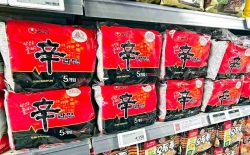16:55 JST, February 18, 2022
For major South Korean companies like Samsung and Hyundai, the Olympics have been, for many years, a golden opportunity to raise brand awareness and promote products. But in the 2022 Beijing Olympics that officially kicked off on Feb. 4, they don’t seem to be taking the sports event as a major arena for their marketing blitzes any more.
For this Winter Games, Samsung Electronics has not published any press releases promoting their sponsorships, a marked departure from when it launched promotional campaigns and set up offline booths at hosting cities for 2014 Sochi, 2016 Rio and 2018 PyeongChang Olympics, even months before the Games’ pronouncement.
“Companies do not want to expose themselves to risks associated with problematic situations,” said the source, who declined to be named. Instead, Samsung is taking the Olympics promotions online.
Its flagship showcase store located in the Beijing shopping district Sanlitun, has moved to the metaverse. At its virtual Samsung Olympics showcase store, visitors can receive limited edition souvenirs.
The company is also operating a virtual media center on a metaverse platform to offer daily Olympics news and real-time sports information for fans.
A special Galaxy Z-flip 3 Olympics edition, which has been launched to boost its zero percent market share in the Chinese smartphone market, will be only sold inside China for 7,999 yuan ($1,260). The products are offered for free to all Winter Games and Paralympic athletes.
It will be also hard to see South Korean carmaker Hyundai Motor’s logo during the Winter Games, which continue through Feb. 20.
With Japanese automaker Toyota clinching an $835 million, 10-year exclusive sponsorship contract with the Olympics organizer, it leaves no room for Hyundai to appear on Olympics scoreboards or electronic signs until 2025.
Hyundai, instead, has decided to promote its hydrogen fuel cell cars in a bid to align with Beijing’s push to promote an eco-friendly Winter Games.
Bringing the Chinese snowboard superstar Zhang Yiwei to the fore as a brand ambassador, Hyundai Motor in January advertised its redesigned fuel cell car Nexo that follows China’s emission standards. The test driving of the Chinese version of Nexo also took place in Beijing’s Daxing hydrogen station, the world’s largest station specially built for fuel cell car operation and hydrogen energy development.
The Nexo Chinese edition has been revamped with three large hydrogen tanks, allowing it to maintain battery performance despite cold temperatures — as low as minus 30 C — in northern Chinese regions.
Market insiders believe Hyundai Motor will likely focus their attention on advertisements during the World Cup, as the Korean carmaker is the official partner of FIFA and owns exclusive marketing rights.
Three international sporting events are taking place in this year alone: the 2022 Beijing Olympics in February, 2022 Asian Games in September in Hangzhou, China, and the Qatar World Cup in November.
Experts say the Olympics could have been a huge marketing opportunity for South Korean companies that have struggled from growing anti-Korean sentiment in recent years as a result of political spats between Seoul and Beijing.
“Korean companies have struggled in China and the Olympics could have been their opportunity [to promote brand reputation and product quality]. But it is regrettable that the timing to do so is not right,“ said an industry insider who requested anonymity.
The ongoing U.S.-China tensions have not only ensnarled South Korean companies, but many other global brands are also choosing to lie low for the time being, according to market experts.
The International Olympics Committee’s 13 Worldwide Partners which includes Coca-Cola, Visa, Airbnb, Samsung Electronics and Toyota are downsizing their advertisements in fear that further association with the Beijing Olympics could backfire.
Some brands like Coca-Cola and P&G have kicked off their advertisements only inside China.
Other multinational brands have opted to steer clear of wordings such as “unity” and “friendly competition” in their advertisements, shortly after U.S. President Joe Biden announced a diplomatic boycott of the Beijing Olympics in December.
Other Western leaders have also publicly boycotted the Winter Games over China’s human rights abuses against Uighurs and other ethnic minorities. China denies those allegations.
While companies say the Olympics should not be linked to geopolitical issues and politics, some view that it is still hard to turn a blind eye to the emerging class of nationalistic consumers in China.
Coca-Cola, one of the longtime Olympics corporate sponsors, said its publicity campaign in the past 2008 Beijing Olympics had the equivalent effect as advertising directly to 500 million people.
Top Articles in World
-

Israeli Ambassador to Japan Speaks about Japan’s Role in the Reconstruction of Gaza
-

Videos Plagiarized, Reposted with False Subtitles Claiming ‘Ryukyu Belongs to China’; Anti-China False Information Also Posted in Japan
-

North Korea Possibly Launches Ballistic Missile
-

Chinese Embassy in Japan Reiterates Call for Chinese People to Refrain from Traveling to Japan; Call Comes in Wake of ¥400 Mil. Robbery
-

Russia: Visa Required for Visiting Graves in Northern Territories, Lifting of Sanctions Also Necessary
JN ACCESS RANKING
-

Japan PM Takaichi’s Cabinet Resigns en Masse
-

Japan Institute to Use Domestic Commercial Optical Lattice Clock to Set Japan Standard Time
-

Israeli Ambassador to Japan Speaks about Japan’s Role in the Reconstruction of Gaza
-

Man Infected with Measles Reportedly Dined at Restaurant in Tokyo Station
-

Videos Plagiarized, Reposted with False Subtitles Claiming ‘Ryukyu Belongs to China’; Anti-China False Information Also Posted in Japan






















